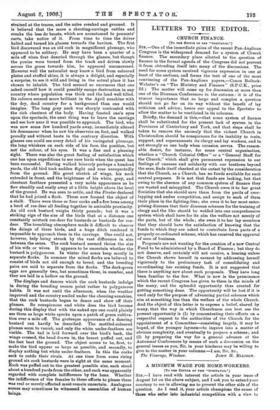LETTERS TO THE EDITOR.
CHURCH FINANCE.
[To TH• EDITOR OT TUB "SPUTATOR.")
Srn,—One of the immediate gains of the recent Pan-Anglican Congress is the widespread demand for a system of Church finance. The secondary place allotted to the question of finance in the formal agenda of the Congress did not prevent it from obtruding itself into many of the discussions. The need for some system received vigorous expression in one at least of the sections, and forms the text of one of the most convincing of the Pan-Anglican papers,—Canon Bullock- Webster's on "The Ministry and Finance" (S.P.C.K., price 2d.) The matter will come up for discussion at more than one of the Diocesan Conferences in the autumn : it is of the utmost importance that so large and complex a question should not go far on its way without the benefit of lay criticism and advice; hence our appeal to the Spectator to allow the matter to be ventilated in its columns.
Briefly, the demand is this,—that some system of finance shall be substituted for the present lack of system in the Provinces of Canterbury and York, and that steps shall be taken to remove the anomaly that the richest Church in Christendom should be conspicuous for its inability to train, support, and superannuate its clergy and lay workers, and to act strongly as one body when occasion serves. The reason- able desire, for instance, for some central organisation, whether a "Church Colonial Office" or a "General Staff for the Church," which shall give permanent expression to our feelings of oneness and Bolidarity with our brethren beyond the seas, finds itself checked at the outset by the consideration that the Church, as a Church, has no funds available for such central purposes. It is not that funds are lacking, but that owing to the absence of any common system of finance they are wasted and misapplied. The Church owes it to her great Societies that she should save them from the perils of over- lapping and undue competition, and assign to each of them their place in the fighting-line; she owes it to her most enter- prising dioceses that their diocesan schemes for the training of clergy and the like should be welded into one comprehensive system which shall have for its aim the welfare not merely of the parts, but of the whole; she owes it to her lay members that they should have the satisfaction of knowing that the funds to which they are asked to contribute form parts of a properly co-ordinated scheme, which has received the approval of men of business.
Proposals are not wanting for the creation of a new Central Fund to be administered by a Board of Finance ; but they do not deserve, and certainly will not receive, a hearing unless the Church shows herself in earnest by addressing herself vigorously to the preliminary task of consolidating and co-ordinating her existing funds. It is not suggested that there is anything new about such proposals. They have long been familiar to the few. What is new is the prominence which the recent Congress has given to them in the minds of the many, and the splendid opportunity thus created for getting something done. The opportunity will be lost if it is used only for the purpose of advancing partial schemes which aim at something less than the welfare of the whole Church. And the object of this letter is to express a belief, shared by many, that the way in which Churchmen can best use the present opportunity is (1) by concentrating their efforts on a respectful request to the authorities of the Church for the appointment of a Committee—consisting largely, it may be hoped, of the younger laymen—to inquire into a matter of obvious complexity, and eventually to prepare a scheme; and (2) by preparing the way for a general advance at the Autumnal Conferences by means of such a discussion on the general issues as you, Sir, in your kindness may be willing to give to the matter in your column.s.—I am, Sir, Stc.,


































 Previous page
Previous page